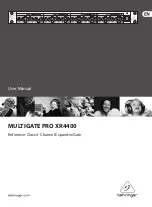
6
MULTIGATE PRO XR4400 User Manual
P/dB
Ear
Microphone Amplifier
Power Amplifier
Tape Radio
Radio
Cassette Recorder
140
120
100
80
60
40
Fig. 1.1: The dynamic range capabilities of various devices
It is therefore useful to keep the operating level as high as possible without
risking signal distortion in order to achieve optimum transmission quality.
It is possible to further improve the transmission quality by constantly
monitoring the program material with the aid of a volume fader, which manually
levels the material. During low passages the gain is increased, during loud
passages the gain is reduced. Of course it is fairly obvious that this kind of
manual control is rather restrictive; it is difficult to detect signal peaks and it is
almost impossible to level them out. Manual control is simply not fast enough
to be satisfactory.
Noise floor
Clipping
Operating level
Effective SNR
Headroom
t
P/dB
+20
0
-20
-40
-60
-80
Fig. 1.2: The interactive relationship between the operating level and the headroom
The need therefore arises for a fast acting automatic gain control system
which will constantly monitor the signals and which will always adjust the
gain to maximize the signal-to-noise ratio without incurring signal distortion.
This device is called a compressor or limiter.
1.1.3 Compressors/Limiters
By measuring the dynamic range of musical instruments in live recording
situations, you will find that extreme amplitudes occur which often lead to
overload in subsequent signal processing equipment. Especially in broadcasting
and record cutting techniques, these signal peaks can lead to heavy distortion.
To avoid this kind of distortion or, for example, to avoid loudspeakers being
damaged by overload, Compressors or Limiters are used.
The principal function used in these devices is dependent on an automatic gain
control as mentioned in the previous section, which reduces the amplitude of
loud passages and therefore restricts the original dynamics to a desired range.
This application is particularly useful in microphone recording techniques,
to compensate for level changes which are caused by varying microphone
distances. Although compressors and limiters perform similar tasks, one essential
point makes them different: Limiters abruptly limit the signal above a certain
level, while compressors control the signal “gently” over a wider range.
A limiter continuously monitors the signal and intervenes as soon as the level
exceeds a user-adjustable threshold. Any signal exceeding this threshold will be
immediately returned to the adjusted level.
A compressor also monitors the program material continuously and has a
certain threshold level. With compression, in contrast to the action of a limiter,
signals are not reduced in level abruptly once the threshold has been exceeded,
but are returned to the threshold gradually. The signal is reduced in gain,
relative to the amount the signal exceeds this point.
Generally, threshold levels for compressors are set below the normal operating
level to allow for the upper dynamics to be musically compressed. For limiters,
the threshold point is set above the normal operating level in order to provide
reliable signal limiting, to protect subsequent equipment from signal overload.
1.1.4 Expanders/Noise gates
Audio, in general, is only as good as the source from which it was
derived. The dynamic range of signals will often be restricted by noise.
Synthesizers, effects devices, guitar pickups, amplifiers etc. generally produce a
high level of noise, hum or other ambient background hiss, which can disturb the
quality of the program material.
Normally these noises are inaudible if the level of the desired signal lies
significantly above the level of the noise. This perception by the ear is based on
the “masking” effect: noise will be masked and thus becomes inaudible as soon
as considerably louder sound signals in the same frequency band are added.
Nevertheless, the further the level that the desired signal decreases, the more
the noise floor becomes a disturbing factor. Expanders or noise gates offer a
solution for this problem: these devices attenuate signals when their amplitudes
drop, thereby fading out the background noise. Relying on this method,
gain controlling amplifiers, like expanders, can extend the dynamic range of a
signal and are therefore the opposite of a compressor.
In practice, it is shown that an expansion over the entire dynamic range is not
desired. With an expansion ratio of 1:5 and a processed dynamic range of 30 dB,
an output dynamic range of 150 dB will be the result, exceeding all subsequent
signal processors, as well as human hearing. Therefore, the amplitude control is
restricted to signals whose levels are below a certain threshold. Signals above
this threshold pass through the unit unchanged. Due to the continuous
attenuation of the signals below this threshold, this kind of expansion is termed
“downward” expansion.
The noise gate is the simplest form of an expander: in contrast to the expander,
which continuously attenuates a signal below the threshold, the noise gate
cuts off the signal abruptly. In most applications this method is not very
useful, since the on/off transition is too drastic. The onset of a simple gate
function appears very obvious and unnatural. To achieve inaudible processing
of the program material, it is necessary to be able to control the signal’s
envelope parameters.

































